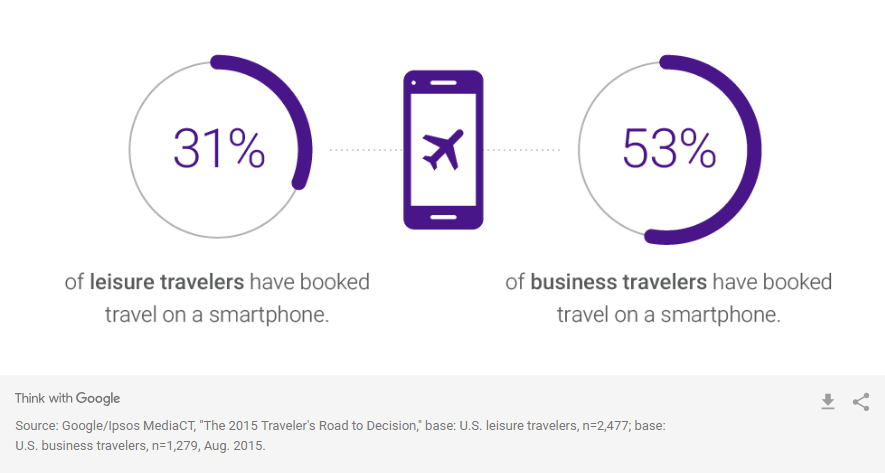Estimated Reading Time [est_time]
Are you currently experiencing an I-want-to-go-moment?
If so, you are certainly not alone.
I defy anyone in the cold, dark month of January to not think for one moment how nice it would be basking on a beach somewhere.
Micro Moments
In the past few years, conversion rates have grown by 88% on mobile travel sites. I’m going to explore how the advent of mobile search and those travel micro-moments have changed the traveller’s consumer journey.
Dreaming moments
The first micro-moment in the travellers’ consumer journey, the moment when you start dreaming about where you might go on holidays. So when is the best time to book a holiday? Looking at Google Trends graph below over the past 5 years there is a consistent spike in January each year, the rest remains fairly consistent.
According to Google, 37% of travellers are thinking about planning a holiday once a month and 17% of travellers are thinking about it once a week.
So what’s the first thing you do when you have one of these moments? 38% of non-branded searches like ‘flights to Florida’, or ‘cruises to the Caribbean’, are carried out on a mobile device. Consumers want to have information available for research purposes at their fingertips and are now turning to Google to ask where to go and what to see. Apparently, these are two of the most asked questions about travel on Google.
Not just that but a video is playing an important part in the travellers’ consumer journey with Google estimating that at any given time 106 million of YouTube’s monthly unique visitors are travellers. Of those who watched travel related videos – 37% watched videos when deciding what website to book on.
This shows how important it is for travel companies to be thinking about these micro-moments and how to tap into them to maximise the sales potential.
Organising moments
The moment when travellers decide on where they will go and how they will get there. It’s all about the logistics, travellers want to know how long it will take them to get from the airport to their hotel, what attractions are nearby, what is there to see and do.
At this point in the consumer journey, according to research, travellers are the most receptive to ‘other options’ when it comes to booking a flight or hotels and it’s not often that they will go with the first brand that comes to mind.
How are they deciding? They are using multiple devices to conduct their research. Mobile flight-related queries on Google.com are up 33% year over year, with mobile hotel queries up by 49%.
For travel marketers wanting to capture consumers in these moments of deciding which airline to fly with or hotel to stay in, then tools like Google Search, Google Flights and Hotel Ads should be part of the marketing mix.
Booking moments
The most important moment in the travellers’ consumer journey, the moment they decide to part with their hard earned cash and the moment that travel marketers have been working towards.
So what are consumers doing at this particular moment?
Interestingly enough it’s not booking the flights or holiday on their mobile, according to Google only 31% of leisure travellers have booked a holiday on their mobile device, whilst 53% of business travellers have booked travel on their mobile devices.
This suggests that although happy to carry out research on the go when it comes to the important act of actually booking a holiday and paying for it, the mobile device is not the first port of call.
Google has found that with the expansion of Book on Google they have improved mobile conversion rates on average by 2X for flight and hotel partners. It allows you to book without leaving the page, it’s optimised for all screen sizes and uses stored card details in a user’s Google account.
For travel marketers, it’s important to optimise this part of the travellers’ journey to make the mobile checkout process as smooth and easy as possible.
Experiencing moments
So the time has come and you’ve finally arrived at your chosen destination. Does that mean the travellers’ journey is over? Not quite – it’s now time to explore the local area, while some research will have been carried out prior to the booking, studies show that mobile queries per user from hotel properties have grown 49% since last year.
Most travellers’ are looking for somewhere to eat, with the most common phrases being (“food near me,” “breakfast near me,” “restaurants near me,” “bars near me”).
This has prompted Google to enhance their mobile travel search experience, to enable easier visualisation and discovery. I came across a great app whilst carrying out some research myself called The Culture Trip. An app designed to allow you to explore what makes a place different, providing cultural insights as well as top tips on the best things to experience.
So what does this mean for travel marketers?
In summary, the way that travellers are researching and booking their holidays has changed drastically and mobile devices have played a big part in this. People are no longer sitting down and carrying out their research in one session, they are constantly embarking on a series of micro-moments which make up the travellers consumer journey.
What does this mean if you’re a travel marketer? It’s imperative that you’re planning out the marketing strategy to reach consumers at each of these touch points and all the ones in between to be ahead of the competition.
Now it’s time to start dreaming…. Where will you be going this year?







